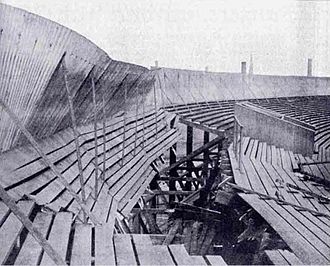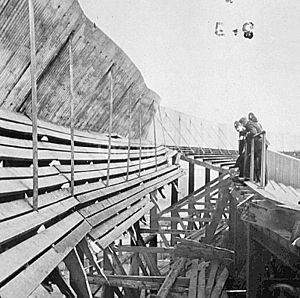1902 Ibrox disaster facts for kids

The collapsed Western Tribune Stand
|
|
| Date | 5 April 1902 |
|---|---|
| Time | Between 15:30 and 16:00 |
| Location | Ibrox Park, Govan, Scotland |
| Deaths | 25 |
| Non-fatal injuries | 500+ |
The 1902 Ibrox disaster was a terrible event that happened at Ibrox Park in Govan, Scotland. Part of the stadium's stand collapsed during a football match. This sad incident led to the deaths of 25 football fans. More than 500 people were also hurt.
The disaster happened on 5 April 1902. It was during an international football game between Scotland and England. This match was part of the 1901–02 British Home Championship.
Ibrox Park was a new stadium, built less than three years before. This was its first international game. About 68,000 people were there to watch. Scotland needed to avoid losing to win the championship title. During the first half of the game, a section of the West Tribune Stand fell down. Between 200 and 300 people dropped to the concrete floor below.
Two people died right away at the stadium. Twenty-three more people died later from their injuries. The last person died three weeks after the event. Even after the collapse, the game continued after a short break. Officials worried that stopping the game might cause more panic. They also feared it would make rescue efforts harder. The game ended in a 1–1 draw. Both the Scottish Football Association and the Football Association later agreed to cancel the result.
A new game was quickly arranged. It was played a month later at Villa Park in Birmingham. All the money from this replay game went to help the victims and their families. This disaster changed how football stadiums were built. Wooden stands were mostly replaced with safer earth or concrete banks.
Contents
Why a New Stadium Was Built
Rangers football club started in 1872. They played at different local fields in Glasgow. Eventually, they settled at Kinning Park. This ground could hold 2,000 people, later expanded to 7,000. But it was not big enough for all their fans. The owners of the land wanted to use it for other things.
So, Rangers built the first Ibrox Park in 1887. This new ground was used for twelve years. Then, their rivals Celtic built Celtic Park in 1892. This made Rangers want an even better stadium. They wanted to host big games like Scottish Cup finals. Hosting Scotland international matches, especially against England, could bring in a lot of money.
The old Ibrox Park had hosted an England–Scotland match in 1892. But after that, Celtic Park hosted the next four games. Rangers' leaders decided to spend £20,000 to build a new Ibrox Park. They wanted to have the best facilities.
The new stadium was built partly on the old site. It opened on 30 December 1899. Rangers won their first game there 3–1 against Heart of Midlothian. Soon after opening, the stadium could hold 75,000 people. The Scottish Football Association (SFA) chose the new stadium to host the 1902 England–Scotland match. This was a very important decision.
The West Tribune Stand Design
The West Tribune Stand was designed by Archibald Leitch. He was a Scottish architect and a big Rangers fan. He offered to design the stand for free. This stand was meant to hold 35,913 people.
However, Leitch himself was worried about how many people it could hold. He visited the stadium before the match to check the stand. But a different expert said the ground was safe. There had been reports that the stand swayed a lot before this day.
The stand was built with a steel frame. Strong vertical beams were set in concrete. Horizontal beams were connected to these. Wooden planks were then placed on top to make steps for fans to stand on. There were 96 steps in total. Each step was about four inches high and fourteen inches wide. It was thought that each person had a space about sixteen inches long and fourteen inches wide.
What Happened on Match Day
Before the Match Started
The 1901–02 British Home Championship began in February 1902. Ireland beat Wales in the first game. Scotland played their first match on 1 March. They beat Ireland 5–1. England, who were the champions from last year, drew their first game against Wales.
Scotland and England both won their second matches. Scotland beat Wales 5–1. England beat Ireland 1–0 a week later. With only one game left, Scotland was ahead by one point. They just needed to not lose against England at Ibrox to win the title.
The Game and the Collapse
On 5 April 1902, the final match of the season began at 3:30 pm. No one officially counted how many people were there. But it's thought that over 68,000 fans attended. About half of them were standing in the West Tribune Stand.
Around 50 stewards were working that day. Most of them were experienced. They had signs to show when the stand was full. The stand had never held so many fans before. It had never been more than half full. Early in the game, fans pushed forward. Police had to step in to control the crowd.
Newspaper reports say the accident happened about 30 minutes into the first half. The back part of the West Tribune Stand collapsed. Hundreds of fans fell up to 40 feet (12 meters) to the ground below.
Several things might have caused the collapse. There was heavy rain the night before. Also, the large crowd was stamping and swaying as the game went on. One idea from an investigation focused on Scottish player Bobby Templeton. He was playing his first game for Scotland. He got the ball just before the collapse. The investigation suggested that fans pushed forward to see him play. This might have helped cause the collapse.
It was also noted that the bottom ten rows of the stand were empty. People had filled the racing track around the pitch. This blocked the view from these lower rows. So, fans on the lower rows kept pushing up. They wanted to avoid being pushed into the empty rows and losing their view.
After the accident, investigators found that 17 joints had broken. This created a hole about 20 yards (18 meters) long in the stand. Some witnesses said they heard loud cracking sounds before the collapse. One witness, who was a carpenter, said he saw the wooden boards split.
Injuries and Deaths
In total, 25 people died. Over 500 people were reported as injured. Their injuries ranged from very serious to minor cuts. The most common cause of death was a broken skull. Fourteen victims died this way. Two of these, Alexander Murray and Bruce Crawford, died instantly at Ibrox Park. By the end of that day, eight people were confirmed dead.
Eight victims died from being crushed. They had severe chest injuries and broken ribs. The other three deaths were due to shock or heart attacks. The last person to die from the disaster was Peter Patterson. He passed away five weeks later on 15 May.
Two weeks after the disaster, The Scotsman newspaper listed the injuries. It said 24 were "dangerously injured," 168 "seriously injured," 153 "injured," and 171 "slightly injured." This made a total of 517 injuries. Other reports said there were as many as 588 injured people. Many people had cuts on their heads. These were likely caused by the broken edges of the wooden planks.
What Happened After
This disaster was seen as the first major stadium accident of its kind. No one from Rangers or the SFA was charged over the incident. However, a criminal investigation did charge Alexander McDougall. He was a timber merchant who supplied the wood for the stand. He was accused of using cheaper yellow pine wood instead of stronger red pine.
Important engineers, Sir Benjamin Baker and Sir William Arrol, spoke in McDougall's defense. They said the type of wood did not cause the disaster. Instead, they blamed the stand's design. They said the design was too weak for the number of people it held. McDougall was found not guilty of the charge.
Archibald Leitch, the architect, was very upset by the accident. He asked Rangers for a chance to fix the problems. He was hired again to help rebuild Ibrox. He went on to design many other football stadiums in Britain. After this accident, wooden frames on steel stands were no longer used. They were replaced with earth banks or strong concrete.
Rangers had won four league championships in a row before the disaster. But after the accident, the club sold some of their best players. They needed money to rebuild Ibrox. Rangers did not win another league championship until 1911.
Help for Victims and Replay Matches
On 19 April 1902, the FA Council said the match would be listed as "unfinished." They also agreed to create a fund to help victims and their families. The FA gave £500 to start the fund. A replay match was organized, and all the money from it went to the fund. The SFA agreed to all these plans.
The replay game was held four weeks later. It took place at Villa Park in Birmingham on 3 May 1902. The game ended in a 2–2 draw. Most of the players were the same as in the original match. Scotland made three changes. This result helped Scotland win the British Home Championship title.
A special club tournament, the British League Cup, was also set up to raise money. Rangers' rivals Celtic also organized a match against Blackburn Rovers to help raise funds.
The Ibrox Park disaster fund helped victims for almost two years. It paid out nearly £18,000 to injured fans. It also gave more than £5,000 to the families of those who died. The remaining money, about £5,500, covered costs. Then it was given to the hospitals that treated the injured.
Ibrox Stadium Changes and Later Events
Ibrox Stadium was greatly changed after the disaster. By the end of 1902, the West Tribune Stand was made much lower. The number of support beams in the stand was tripled. This was done to make it impossible for a fan to fall through, even if the boards broke. Matches started again that same year. But only a limited number of fans were allowed in each stand.
Later, in 1963, people worried about the safety of Stairway 13. This was an exit close to Copland Road subway station. On 16 September 1961, two people died in a crowd crush on this stairway. There were two other incidents in 1967 and 1969 where several people were hurt. Rangers had spent £150,000 to improve safety. Despite this, another larger disaster happened at Ibrox in 1971. In that event, 66 people died in a crush as fans tried to leave the stadium after a game.
See also
- 1971 Ibrox disaster
- England national football team results (unofficial matches)
- England–Scotland football rivalry
- List of disasters of the United Kingdom and preceding states
- List of structural failures and collapses
- Scotland national football team results (unofficial matches)
 | Toni Morrison |
 | Barack Obama |
 | Martin Luther King Jr. |
 | Ralph Bunche |


